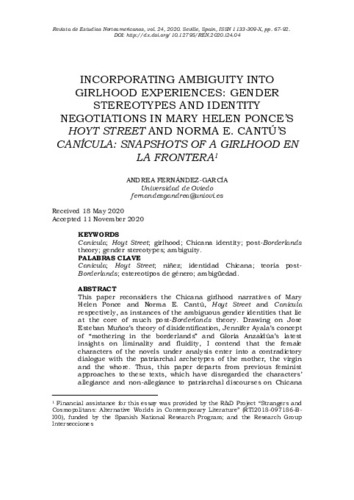A Tolerance for Ambiguity: Falling in and out of Gender Stereotypes in Mary Helen Ponce’s Hoyt Street and Norma E. Cantú’s Canícula: Snapshots of a Girlhood en la Frontera
Autor(es) y otros:
Palabra(s) clave:
Estudios de Género
Literatura Chicana
Fecha de publicación:
Versión del editor:
Citación:
Descripción física:
Resumen:
This paper reconsiders the Chicana girlhood narratives of Mary Helen Ponce and Norma E. Cantú, Hoyt Street and Canícula respectively, as instances of the ambiguous gender identities that lie at the core of much post-Borderlands theory. Drawing on Jose Esteban Muñoz’s theory of disidentification, Jennifer Ayala’s concept of “mothering in the borderlands” and Gloria Anzaldúa’s latest insights on liminality and fluidity, I contend that the female characters of the novels under analysis enter into a contradictory dialogue with the patriarchal archetypes of the mother, the virgin and the whore. Thus, this paper departs from previous feminist approaches to these texts, which have disregarded the characters’ allegiance and non-allegiance to patriarchal discourses on Chicana emininity. My aim with this essay is to advance new readings of these girlhood narratives as well as to contribute to research into the fragmentary and largely evasive character of Chicana identities.
This paper reconsiders the Chicana girlhood narratives of Mary Helen Ponce and Norma E. Cantú, Hoyt Street and Canícula respectively, as instances of the ambiguous gender identities that lie at the core of much post-Borderlands theory. Drawing on Jose Esteban Muñoz’s theory of disidentification, Jennifer Ayala’s concept of “mothering in the borderlands” and Gloria Anzaldúa’s latest insights on liminality and fluidity, I contend that the female characters of the novels under analysis enter into a contradictory dialogue with the patriarchal archetypes of the mother, the virgin and the whore. Thus, this paper departs from previous feminist approaches to these texts, which have disregarded the characters’ allegiance and non-allegiance to patriarchal discourses on Chicana emininity. My aim with this essay is to advance new readings of these girlhood narratives as well as to contribute to research into the fragmentary and largely evasive character of Chicana identities.
ISSN:
Patrocinado por:
Financial assistance for this essay was provided by the R&D Project “Strangers and Cosmopolitans: Alternative Worlds in Contemporary Literature” (RTI2018-097186-BI00), funded by the Spanish National Research Program; and the Research Group Intersecciones.
Colecciones
- Artículos [37543]
- Filología Inglesa, Francesa y Alemana [587]
- Investigaciones y Documentos OpenAIRE [8391]
Ficheros en el ítem




